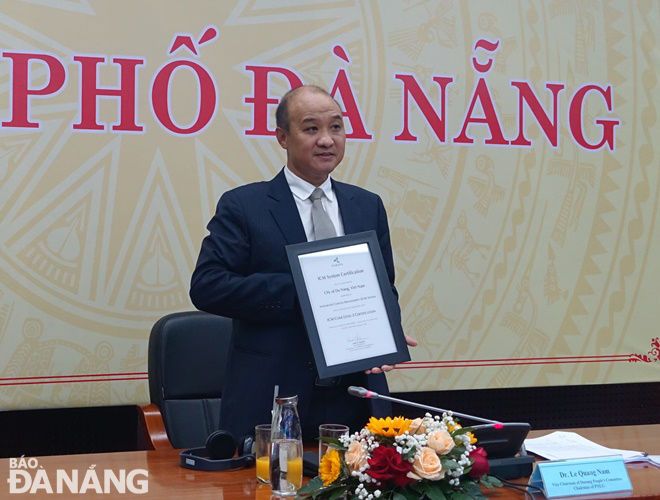PEMSEA awards ICM Certification to Da Nang
Da Nang People's Committee Vice Chairman Le Quang Nam received PEMSEA's Integrated Coastal Management (ICM) System Certification at the plenary session of the 2022 Forum of the PEMSEA Network of Local Governments (PNLG) which concluded on Wednesday afternoon.
Acknowledging the contribution of local governments in the sustainable development of the Seas of East Asia through their Integrated Coastal Management (ICM) programs, PEMSEA has announced the re-certification and advancement to the next level of certification to selected ICM sites in the region.
Level 2 Certification of the ICM System was awarded to Da Nang (Viet Nam), Rreah Sihanouk (Cambodia), and Guimaras (the Philippines) while Tangerang (Indonesia) achieved Level 1 Certification.
 |
| On behalf of Da Nang’s leaders, Vice Chairman Le Quang Nam received PEMSEAs Integrated Coastal Management (ICM) System Certification. Photo: HOANG HIEP |
In his remarks at the event, Vice Chairman Le Quang Nam said that Da Nang would exert greater efforts to continually improve its established system to achieve better benefits and measured success, and to pursue higher levels of certification for its ICM system. He also hoped that local governments (PNLG) would achieve certification of their ICM system.
PEMSEA’s ICM System Certification is designed for local governments seeking validation of their ICM System and recognition for excellence and continuous improvement.
PEMSEA established and implemented the ICM System Certification in 2015 as part of its services. The ICM System Certification formally evaluates, acknowledges and certifies that a local government’s ICM system conforms to the requirements of the ICM Code. The ICM Code details good governance practices for an ICM system, including a long-term vision and strategy for the coastal area, an implementation plan, a multisectoral coordinating mechanism and supporting legislation, as well as enabling conditions for public awareness, capacity development and financing mechanisms. In addition to governance, the ICM Code covers the development and implementation of management programs to address priority issues including: natural and man-made hazard prevention and management; habitat protection, restoration and management; water use and supply management; food security and livelihood management; and pollution reduction and waste management.
The ICM System Certification is structured as a tri-level approach to encourage local government to strive for excellence through continuous improvement. The Three Levels of Certification are:
Level 1: Proficient in ICM Governance Level (The ICM System is developed and implemented compliant with the Level 1 Requirements of the ICM Code);
Level 2: Effective ICM System Level (Significant progress in building sound process and environmental benefits demonstrated in priority areas and consistent with requirements of ISO 14001 and ISO 9001);
Level 3: Blue Economy Level (High level of excellence in ICM with sustainable development benefits demonstrated, maintained and continually improved).
To achieve certification, a local government’s ICM system needs to undergo the ICM System Development, Implementation and Continuous Improvement Process, which is comprised of four phases: Phase 1: Initial Status Review; Phase 2: Strategic Planning; Phase 3: System Development and Documentation; and Phase 4: Monitoring and Measurement.
In 2015, with the support of the PEMSEA Network of Local Government (PNLG), initial status reviews of the ICM System were conducted on 15 local governments in the region. The PRF conducted the desktop and onsite audits of the sites. At the 2015 East Asian Seas (EAS) Congress in Da Nang, Viet Nam, all 15 local governments were awarded ICM Level 1 Certification of their ICM Systems.
Reporting by HOANG HIEP – Translating by H.L